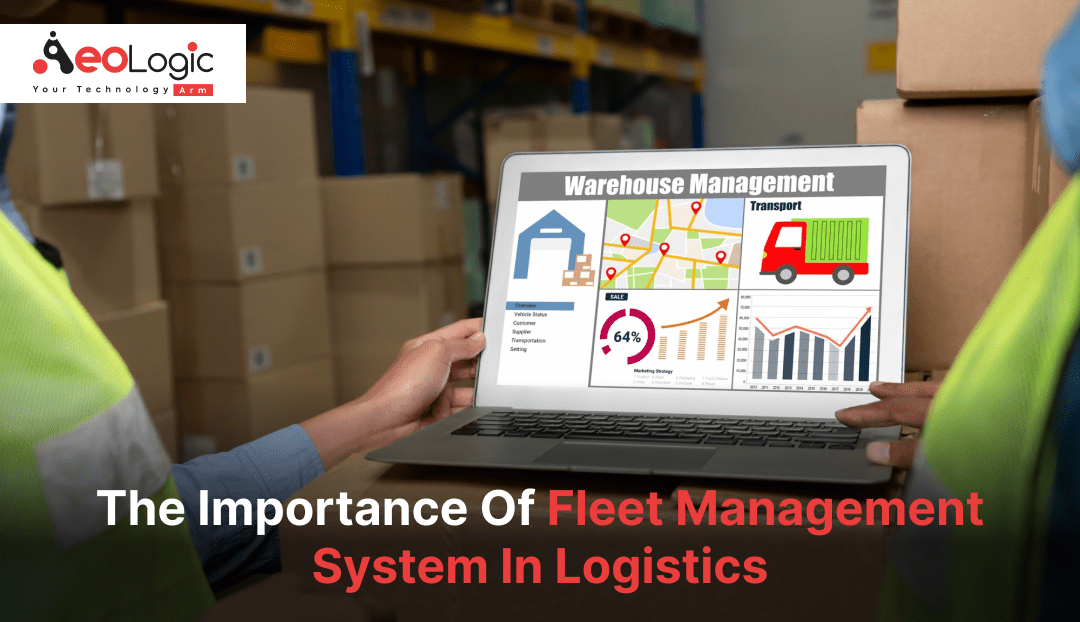Logistics management is an important aspect of any business that needs to be managed efficiently. In general, logistics refers to the planning and control of the movement of materials and goods from a supplier to a client. It is an essential component of the supply chain, a network of companies that collaborate to manufacture and deliver commodities. Many tools and techniques can help an industry manage logistics efficiency. Fleet Management Systems in Logistics play a vital role in ensuring smooth, efficient, and cost-effective operations.
Overview
Fleet management is a crucial aspect that plays an important part in logistics. Put a fleet in logistics refers to a collection of automobiles that a company or organization owns or leases to move cargo, personnel, or customers. In the supply chain’s last-mile phase, fleets are an essential component of delivery operations. There are many goods, products, resources etc that are delivered from one place to another using trucks. So it is important to manage the groups of vehicles efficiently so that they do not make any bad impact on logistics. There can be multiple issues like no optimization of route, more fuel consumption, loss of items, route loss, etc that overall affect the organization.
To resolve issues related to the fleet in logistics, there is a fleet management system that has been developed to track, gather information, real-time visibility, etc functions provided to the headquarters.
Related Statistics to Fleet Management Systems in Logistics
The global fleet management market is expected to grow to $21.33 billion in 2024, with a compound annual growth rate (CAGR) of 16.1%. This growth is due to several factors, including fuel cost management, vehicle tracking and visibility, maintenance optimization, cost reduction initiatives, and route optimization.
Factors like speed, cost, and general efficacy of transportation operations are all directly and positively impacted by proper fleet management systems. Whether a company has a small fleet of trucks or a huge, international fleet, a fleet management system (FMS) helps them monitor, manage, and maximize their fleet of vehicles. Overall, this technology has the potential to bring evolution in logistics for organizations.
In this article, we will see the importance of fleet management systems in logistics. We will also see some additional details like benefits, challenges, etc and in the end, end the discussion with a concluding paragraph.
What Is A Fleet Management System in Logistics?
A fleet management system (FMS) in the logistics industry refers to a collection of software tools and technologies that assist companies in managing and supervising their fleet of vehicles, including delivery cars, trucks, vans, and other vehicles used for transportation.
The main objective of the fleet management system is to increase a fleet’s productivity, safety, and efficiency while lowering operating expenses and guaranteeing legal compliance. It includes everything from scheduling maintenance to optimizing routes to monitoring driver behavior and managing fuel. There are many other benefits that we will see later in the upcoming paragraph.
Also Read: The Role of IoT in Fleet Management Solutions for Enterprises
Top Fleet Management Technologies Transforming Logistics in 2025
Here’s an some of the top fleet management technologies transforming logistics in 2024, helping companies enhance efficiency, safety, and cost savings:
GPS Tracking and Telematics
GPS tracking systems give real-time location updates, enabling precise tracking of every vehicle in the fleet. Telematics combines GPS with onboard diagnostics, allowing logistics companies to monitor driving behavior, fuel usage, and vehicle health. With these insights, companies can make smarter decisions on routes, fuel efficiency, and maintenance scheduling. Aeologic Technologies offers cutting-edge GPS tracking solutions to keep your fleet moving efficiently.
IoT-Enabled Fleet Sensors
Internet of Things (IoT) technology integrates sensors in fleet vehicles, tracking everything from tire pressure to cargo temperature. These sensors alert fleet managers of issues before they escalate, helping prevent breakdowns and ensure safety. Aeologic Technologies specializes in IoT solutions that keep fleets in top shape, reducing unexpected delays and enhancing operational safety.
AI and Predictive Analytics
Artificial Intelligence (AI) and predictive analytics bring powerful data analysis tools to fleet management. By predicting maintenance needs, analyzing fuel efficiency, and optimizing routes, AI helps reduce costs and improve service quality. Aeologic Technologies uses AI-driven analytics to provide actionable insights, helping logistics companies stay ahead of potential issues and streamline their operations.
Cloud-Based Fleet Management Software
Cloud-based solutions allow fleet managers to access data anytime, anywhere. They enable real-time communication, remote monitoring, and centralized data management. This flexibility is essential for logistics companies aiming to maintain 24/7 operations. Aeologic Technologies offers cloud-based fleet management platforms that ensure easy access and efficient fleet oversight.
Automation in Compliance and Reporting
Automated solutions in fleet management make regulatory compliance and reporting faster and more accurate. From tracking hours of service (HOS) to ensuring vehicle safety standards, automated compliance tools reduce administrative work and minimize human error. Aeologic Technologies provides tailored compliance automation solutions to keep logistics operations safe and compliant.
By using these technologies, logistics companies can gain a competitive edge in today’s market. Aeologic Technologies offers customized solutions in fleet management to help businesses improve performance, cut costs, and achieve success in 2024 and beyond. Connect with Aeologic Technologies today to explore the best solutions for your fleet needs.
Benefits of Fleet Management System In Logistics
There are many benefits of a fleet management system in logistics as here are a few key benefits mentioned below.
Cost Efficiency
To enhance logistics, it is important to maintain cost efficiency. Fleet management systems can enhance cost efficiency in various ways such as by optimizing routes, reducing idle times, and monitoring driving behavior. Maintenance also gets enhanced proactively with the fleet management system. Overall, this technology can enhance the cost efficiency that directly benefits the logistics.
Real-Time Dispatching and Tracking
With the fleet management system, fleet managers can keep an eye on the position of their logistics-carrying vehicles, the status of deliveries, and any possible problems with real-time GPS tracking. This enables them for real-time tracking that helps them to make any decision if there is anything wrong detected like route diversion or missing products.
Enhance Safety by Driver Behavior Monitoring
Safety is an important measure while operating logistics using the fleet as fleet management systems can track driver behavior, including speed, braking, acceleration, and seatbelt use. This makes it easier to spot unsafe driving practices, enabling managers to address them with criticism or training, thus increasing safety.
Improved Customer Experience
Customer is the most important aspect for any business as it is important to deliver logistics on proper time to the customers. With the fleet management system, customers can have proper information through tracking facilities that increase trust for customers and improve their experience towards the organization.
Data-Driven Decision Making
Fleet management systems produce comprehensive data and reports that provide explained details on a variety of topics, including driver behavior, fuel usage, and fleet performance. Fleet managers can use these insights to pinpoint areas for improvement, optimize operations, and make well-informed decisions. This overall increases the efficiency of the logistics.
Also Read: Advantages of Using RFID in Fleet Management for Car Rental
Challenges with the Fleet Management System In Logistics
We have seen various benefits of fleet management systems in logistics as there could be some potential challenges too. Here are a few challenges mentioned below.
- High initial investment and implementation costs can be a concerning thing for many small businesses as they cannot afford this technology with insufficient capital.
- Data overload can be another issue sometimes as the fleet management system manages a lot of data and this sometimes can create a situation of system crash.
- Employees may resist change of working methods due to fear of job loss so it can also be a concern in many instances.
Also read: Role of Technologies and Mobile Apps in Waste Management
Final Words: Fleet Management Systems in Logistics
For logistics aspects to increase operational effectiveness, cut expenses, and boost customer satisfaction, a fleet management system, or FMS, is essential. A fleet management system reduces fuel usage, avoids failures, and enhances fleet safety by scheduling preventive maintenance, tracking driver behavior, and optimizing routes. It guarantees adherence to rules and offers insightful data for improved decision-making.
We have also seen some potential challenges that are surely going to be overcome with advancements and development. Businesses that use fleet management systems have a better chance of increasing service quality, increasing profit margins, and creating a scalable, sustainable business model in the cutthroat logistics industry of today.
A strong fleet management system is key for making logistics smooth, safe, and cost-effective. It helps run operations better and achieve more. Connect with Aeologic Technologies for a solution that fits your needs.







